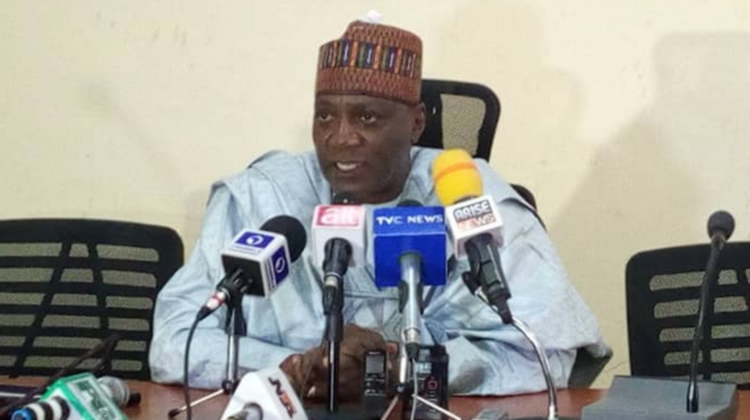The Peoples Democratic Party (PDP) is grappling with internal strife, as highlighted by the party’s National Deputy Publicity Secretary, Ibrahim Abdullahi, during a press conference titled “Fix PDP to Fix Nigeria” held in Abuja. Amid ongoing crises stemming from both pre-election and post-election challenges, Abdullahi refuted claims that the party is under the influence of Nyesom Wike, the Minister of the Federal Capital Territory. He argued instead that the real issues afflicting the PDP are largely a result of the actions of its 2023 presidential candidate, Atiku Abubakar. Abdullahi drew attention to Atiku’s previous erratic shifts between political affiliations, which he believes have diminished trust and support from stakeholders, hence impacting the party’s standing among Nigerians who once viewed it as a formidable opposition against the ruling All Progressives Congress (APC).
The fallout from the recent 2023 elections has led to growing discontent within the ranks of the PDP, with accusations being leveled against Acting National Chairman Umar Damagum for failing to reinvigorate the party’s fortunes. While some party members point to Wike’s influence as a destabilizing force, others argue that Atiku and various party leaders bear the brunt of responsibility for the deepening crisis. Abdullahi underscored how the current National Working Committee (NWC) has inherited complex challenges. He notably criticizes Atiku for his role in endorsing the administration of former President Muhammadu Buhari, which he perceives as detrimental to the country and the party’s credibility.
Adding to the critique, Ikenga Ugochinyere, a lawmaker from Imo State, placed significant blame on both Damagum and Wike for the difficulties being faced by the PDP. He pointed to the exodus of lawmakers and other influential stakeholders from the party, claiming that its longstanding symbol, the umbrella, no longer offers adequate protection or appeal. Ugochinyere characterized the current state of the PDP as lacking clarity in its role as an opposition party, expressing concern that it is not functioning effectively against the backdrop of a governing party perceived to be more cohesive and organized in their objectives.
Ugochinyere further elaborated on how the PDP has failed to uphold the ideals of a robust opposition party, a role Nigeria was once known for in African political circles. He lamented the lack of internal reflection and accountability within the PDP regarding the strategies of the past and their continued impact. Instead of taking a thoughtful assessment of their current performance, many in the party seem to dwell on historical grievances, which, according to Ugochinyere, hinders progress and reformative efforts. He concurs with Abdullahi’s sentiments regarding Atiku’s frequent political maneuvering leading to a diminished reputation for the party.
Concerned about the continuing crises, Ugochinyere warned that if the current challenges remain unresolved, the PDP risks becoming a figure of ridicule among the populace. He argued that an essential aspect of the NWC’s responsibilities is not only to implement justice but also to be perceived as doing so transparently. He pointed out the party’s significant losses during the elections, indicating that the current situation must spur a sense of urgency and innovative thinking to rekindle the party’s foundational strength. Ugochinyere highlighted that the new political generation is moving away from the PDP, as evidenced by Peter Obi diversifying his base and outpacing the party in terms of state representation.
In addressing the leadership crises, Ugochinyere emphasized the importance of adhering to established party protocols concerning the selection of leadership. He asserted that the NWC’s struggles reflect a broader inability to navigate internal disputes effectively, which has only exacerbated tensions. He positioned Wike as someone whose allegiance appears to align more closely with the APC, thereby framing him as part of the challenges faced by the PDP. Ultimately, Ugochinyere posited that addressing these internal dynamics and restoring a sense of focus on the PDP’s opposition role will be crucial to revitalizing the party’s image both within the political landscape of Nigeria and in the eyes of the electorate.
In conclusion, both Abdullahi and Ugochinyere effectively encapsulated the urgency for introspection and reform within the PDP. The statements emanating from the party’s leadership reflect a recognition of the critical juncture facing the PDP, necessitating a reevaluation of its leadership and strategies to fortify its position as a credible opposition party. The road ahead involves confronting uncomfortable truths about past leadership failures while rallying the party’s base around a clearer vision and renewed commitment to political integrity and public service. Choosing to focus inwardly on reconciliation, strategic unity, and ethical leadership will be vital as the PDP seeks to re-establish its relevance and restore faith among its supporters and the Nigerian public.


